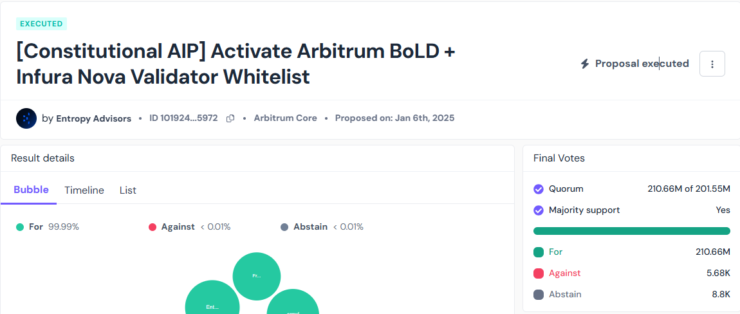Quick Stats
- Arbitrum BoLD is now live on mainnet, enabling permissionless validation.
- Validators no longer require permission from Offchain Labs to secure the network.
- The upgrade makes Arbitrum more resistant to censorship and single points of failure.
- The launch follows a Governance vote, months of testing and community feedback.
Offchain Labs, the development team behind Arbitrum, has implemented Bounded Liquidity Delay (BoLD), a new dispute resolution protocol designed to enable permissionless validation on the Arbitrum Layer 2 network. The upgrade, which was approved through governance voting, is now live on both Arbitrum One and Arbitrum Nova, marking a critical step toward decentralization.

With BoLD now in place, the previous system that restricted validation to an allow-listed set of validators has been removed. Instead, anyone can now participate in securing the network, reinforcing a more trustless, decentralized ecosystem.
Validation on optimistic rollups, like Arbitrum, has historically been complex. While fraud proofs exist to catch invalid state updates, chains remain vulnerable to denial-of-service attacks, where malicious validators could delay withdrawals or state confirmations indefinitely.
The introduction of BoLD removes these risks by allowing multiple independent validators to post and challenge state assertions. This mechanism ensures that network security is no longer reliant on a small group of pre-approved validators, reducing censorship risks and making the rollup more resistant to attacks.
Offchain Labs highlighted that BoLD is designed to be a self-sustaining mechanism, preventing any entity from monopolizing network validation and ensuring that disputes are resolved efficiently.
Arbitrum’s Path to Full Autonomy
The implementation of BoLD is a key milestone in Arbitrum’s roadmap toward full decentralization. By introducing a permissionless dispute resolution mechanism, the upgrade moves away from a centralized validator model, ensuring that anyone can participate in securing the network.
Unlike zero-knowledge rollups, which require cryptographic proofs for each transaction, optimistic rollups assume all transactions are valid unless proven otherwise. While this allows faster processing, it also means fraudulent transactions must be challenged manually. BoLD modernizes this approach by introducing an interactive, time-bound fraud-proof system, capping dispute resolution to 12 days across Arbitrum chains.
Previously, bad actors could indefinitely delay fraud resolution by continuously opening disputes and forfeiting bonds, effectively extending the challenge period. With BoLD, such tactics are no longer viable, as the system ensures disputes will always be settled within a fixed timeframe.
Beyond improving security, this shift also brings Arbitrum closer to Ethereum’s vision of a trust-minimized, censorship-resistant ecosystem.





